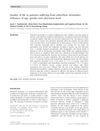
Drinking sweetened tea and poor sleep increase the risk of hair loss in women.

Drinking sweetened tea and poor sleep habits increase the risk of hair loss in women.

Drinking sweetened tea and late bedtimes increase the risk of hair loss in women.

Drinking sweetened tea and late bedtimes increase the risk of hair loss in women.
 October 2023 in “Frontiers in endocrinology”
October 2023 in “Frontiers in endocrinology” Androgens and androgen receptors are important for metabolic health, affecting how the body uses glucose and fats through mitochondrial function.
 March 2023 in “Journal of the turkish academy of dermatology”
March 2023 in “Journal of the turkish academy of dermatology” High levels of ceruloplasmin might indicate more severe toenail fungus.
 December 2022 in “International Journal of Biomedicine”
December 2022 in “International Journal of Biomedicine” Androgens may worsen COVID-19 and hair loss could indicate the disease's severity.
 January 2018 in “Springer eBooks”
January 2018 in “Springer eBooks” Different races and genders have unique skin and hair issues, requiring specialized care and more research for effective treatment.
 48 citations,
January 2002 in “Dermatology”
48 citations,
January 2002 in “Dermatology” Hair pain is more common in women with hair loss, but it's not linked to the cause or severity of hair loss.
 39 citations,
June 2017 in “Scientific Reports”
39 citations,
June 2017 in “Scientific Reports” Different lab conditions and light treatment methods change how human skin cells respond to light therapy.
 31 citations,
January 2016 in “Drugs - Real World Outcomes”
31 citations,
January 2016 in “Drugs - Real World Outcomes” Some new oral anticoagulants may also cause hair loss and might not be better than traditional ones for preventing hair loss.
 9 citations,
May 2021 in “Dermatologic Therapy”
9 citations,
May 2021 in “Dermatologic Therapy” Possible link between androgens and COVID-19 severity; more research needed.
 1 citations,
April 2024 in “Archives of disease in childhood”
1 citations,
April 2024 in “Archives of disease in childhood” Many children and teens referred to gender services receive hormone treatments, but more research is needed on their long-term care and outcomes.
 134 citations,
April 2020 in “Journal of Cosmetic Dermatology”
134 citations,
April 2020 in “Journal of Cosmetic Dermatology” Male pattern hair loss could hint at androgens affecting COVID-19 severity.
 120 citations,
October 2007 in “Clinical Interventions in Aging”
120 citations,
October 2007 in “Clinical Interventions in Aging” Estrogens help reduce skin aging, and SERMs might offer similar benefits without the risks of hormone therapy.
 46 citations,
May 2012 in “Molecular and Cellular Endocrinology”
46 citations,
May 2012 in “Molecular and Cellular Endocrinology” Human skin produces sex hormones like estrogen and testosterone, influenced by ARO and StAR, which may affect skin elasticity and hair growth.
 27 citations,
January 2013 in “The journal of investigative dermatology/Journal of investigative dermatology”
27 citations,
January 2013 in “The journal of investigative dermatology/Journal of investigative dermatology” Somatostatin may help protect hair follicles from immune attacks.
 20 citations,
December 2016 in “American Journal of Clinical Dermatology”
20 citations,
December 2016 in “American Journal of Clinical Dermatology” Men prefer less invasive cosmetic procedures and need different treatment approaches than women.
 January 2023 in “Journal of men's health”
January 2023 in “Journal of men's health” Higher dihydrotestosterone may be linked to more inflammation in COVID-19 patients with low testosterone.
 197 citations,
January 2019 in “Neuropsychopharmacology”
197 citations,
January 2019 in “Neuropsychopharmacology” Male and female bodies respond differently to stress, influenced by hormones and development stages, with implications for stress-related diseases.
 59 citations,
September 2008 in “Mycoses”
59 citations,
September 2008 in “Mycoses” Seborrheic dermatitis lowers quality of life more for women, younger people, and those with more education.
 29 citations,
November 2018 in “Journal of The European Academy of Dermatology and Venereology”
29 citations,
November 2018 in “Journal of The European Academy of Dermatology and Venereology” Personality traits and anxiety affect hair loss patients' quality of life.
 1 citations,
December 2018 in “IntechOpen eBooks”
1 citations,
December 2018 in “IntechOpen eBooks” Human hair shows promise for non-invasive medical testing, but more research is needed to standardize its use.

Tacrolimus causes fewer acute rejections than cyclosporin A in kidney transplants but doesn't necessarily improve kidney function after one year; cardiovascular risks and side effects vary between the two drugs.
 December 2020 in “Current Sexual Health Reports”
December 2020 in “Current Sexual Health Reports” Finasteride can have lasting negative effects on brain function and behavior by disrupting neurosteroid production.
 January 2022 in “Medical research archives”
January 2022 in “Medical research archives” Taking vitamin D might improve life for MS patients and reduce skin side effects from alemtuzumab treatment.
 January 2023 in “Operative Techniques in Otolaryngology-Head and Neck Surgery”
January 2023 in “Operative Techniques in Otolaryngology-Head and Neck Surgery” Hair transplants help transgender patients look more like their gender identity, with different procedures for trans women and men.

Women often choose food based on taste and availability, not health benefits, leading to a lack of awareness about healthy eating.
 4 citations,
October 2021 in “Canadian Journal of Physiology and Pharmacology”
4 citations,
October 2021 in “Canadian Journal of Physiology and Pharmacology” Women with pancreatic cancer are more likely to have certain side effects from chemotherapy than men.
 1 citations,
April 2022 in “Emergency Medicine Australasia”
1 citations,
April 2022 in “Emergency Medicine Australasia” The document concludes that respectful, gender-affirming healthcare improves mental health and encourages continued medical care for transgender and non-binary individuals.






























